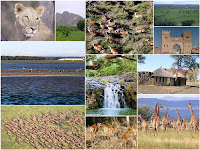Water: where does Africa stand?

Africa has large disparities in water availability: the North and the South have less water than Central and Western Africa - with the DRC being the wettest and Mauritania, the driest. Countries close to the Great Lakes have abundant supply of water, and yet - even in these countries, most people do not have access to clean drinking water. Overall, Africa still has the lowest water supply and sanitation coverage in the world, which is worse in the rural areas - making diseases (such as diarrhoea and malaria) and hunger, regular threats. As if all these sad factors are not enough, the African continent is said to be the most vulnerable to climate change, which in turn will result only in more sufferings and devastation on the continent. Most disturbing of all: while the total number of undernourished and malnourished people worldwide has fallen, the proportion of the sub-Saharan Africa population has remained virtually unchanged and even increased, in some countries. The main cause for all this, is not only lack of peace and stability in many African countries, but also - lack of clean, safe drinking water.
Still, even with all these disheartening facts, if Africa can have good, enlightened leadership and governance - many, if not most of its water related problems can be solved. If African leaders can serve Africa with: integrity, honesty and vision, Africans too, can - have the joy and benefits of having safe, clean drinking water. African regional organisations and bodies; and the African Union most of all, should make the provision of safe drinking water - a priority. Or should I say: the priority. Which means: the underlying factors that hinder this - such as wars, instabilities, corruption, poor governance, lack of democracy, misuse of natural resources (like carelessly building dams) and not taking care of the environment - should be tackled and solved. First. Otherwise, the future for Africa, in relation to Water, is too bleak. Just: too bleak.
Reference: UNECA
Image from: Water for People


